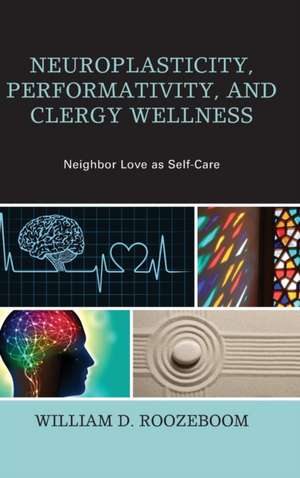Neuroplasticity, Performativity, and Clergy Wellness: Emerging Perspectives in Pastoral Theology and Care
Autor William D. Roozeboomen Limba Engleză Hardback – feb 2017
This book invites readers, particularly clergy members, to rethink their understandings of the human person in light of recent developments in neuroscience. In addition to bringing together religion and neuroscience, it engages narrative theory, exercise physiology, and constructions of wellness to raise crucial questions about human identity and relationality and argue for a model of care that connects self-care and care for/with others. Furthermore, it claims that human beings are whole, intra/inter-relational, dynamic, plastic, and performative agents who have the capacity to story themselves neurophysiologically (in both top-down and bottom-up ways) through their regular practices of wellness."
Din seria Emerging Perspectives in Pastoral Theology and Care
- 19%
 Preț: 531.03 lei
Preț: 531.03 lei - 5%
 Preț: 845.82 lei
Preț: 845.82 lei - 23%
 Preț: 685.85 lei
Preț: 685.85 lei - 23%
 Preț: 688.37 lei
Preț: 688.37 lei - 5%
 Preț: 797.72 lei
Preț: 797.72 lei -
 Preț: 325.13 lei
Preț: 325.13 lei - 5%
 Preț: 350.54 lei
Preț: 350.54 lei - 5%
 Preț: 328.42 lei
Preț: 328.42 lei - 23%
 Preț: 556.61 lei
Preț: 556.61 lei - 23%
 Preț: 616.83 lei
Preț: 616.83 lei -
 Preț: 347.03 lei
Preț: 347.03 lei - 23%
 Preț: 589.13 lei
Preț: 589.13 lei - 23%
 Preț: 589.24 lei
Preț: 589.24 lei - 23%
 Preț: 648.64 lei
Preț: 648.64 lei -
 Preț: 307.00 lei
Preț: 307.00 lei - 32%
 Preț: 450.65 lei
Preț: 450.65 lei
Preț: 603.33 lei
Preț vechi: 783.55 lei
-23% Nou
115.45€ • 120.94$ • 95.68£
Carte tipărită la comandă
Livrare economică 08-22 aprilie
Specificații
ISBN-10: 1498521274
Pagini: 176
Ilustrații: 1 black & white illustrations, 4 tables
Dimensiuni: 237 x 160 x 21 mm
Greutate: 0.43 kg
Editura: Rowman & Littlefield
Seria Emerging Perspectives in Pastoral Theology and Care
